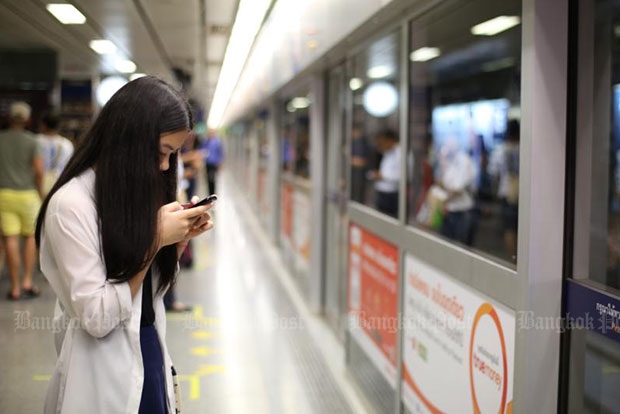
Mobile virtual network operators (MVNOs) will have to use an online fingerprint ID system for new prepaid and postpaid mobile SIM card registrations by March without exception, says the National Broadcasting and Telecommunications Commission (NBTC).
An MVNO is a company that provides mobile service but does not have its own mobile network. MVNOs have called on the regulator over the past several months to exempt them from the rule, saying the system will impose additional cost burdens on them and make it difficult for them to compete with major mobile operators.
All mobile operators will have to introduce the online fingerprint ID system by March, but mobile users can choose whether or not to put their fingerprints in the system for their own security.
"Any violation will face penalties ranging from a fine, to a ban on receiving new mobile numbers from the regulator, to a licence revocation," said NBTC secretary-general Mr Takorn.
Mr Takorn urged all mobile users to participate in the fingerprint system to ensure greater security in mobile banking and prevent the risk of fraud, which is likely to increase in a cashless society.
He insisted that the fingerprint system will complement the existing registration system. The regulator will not force all mobile users to register with the new system.
Thailand has 103 million mobile subscribers, 14 million of whom use mobile banking services.
Mobile banking is a service provided by banks or other financial institutions as well as mobile operators that allows customers to conduct some financial transactions remotely using any mobile device, with no bank account required.
The popularity of mobile banking activities marks a significant trend taking place in banking.
Fraud and other criminal acts targeting telecommunication networks are also becoming increasingly sophisticated.
Mr Takorn acknowledged that the system might add extra costs to MVNOs who have fewer outlets, but the system is necessary as the government is pushing the country towards a digital-driven economy.
"We cannot accept the MVNO's request, as consumer benefits must come first," Mr Takorn said.
Citing an NBTC study, he said the online fingerprint ID system will cost 1,000-2,000 baht per registration.
He said the fingerprint system investment can be deducted as a business expense from the universal service obligation (USO) fee operators pay annually to the NBTC.
Telecom operators have to share 5% of their total revenue with the NBTC. Of the total, 3.5% goes toward the USO fee and the remaining 1.25% goes to the licensing fee.
In fact, Mr Takorn said the fingerprint system might only cause an inconvenience to mobile operators and MVNOs.
Nipon Chuchird, president of Data CDMA Communication, a MVNO providing 3G service on CAT Telecom's 850-megahertz network, said the company is ready to comply with the rule despite the inconvenience to its operations.
Data CDMA has 100,000 subscribers using postpaid service under My World brand.
The company plans to introduce prepaid mobile service within next month, Mr Nipon said.